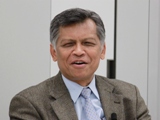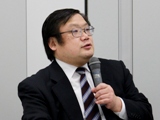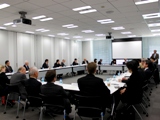Event Report International Exchange
CIGS Seminar:"Stability in Asia and Roles of Stakeholders"
February 26, 2013,
10:30
- 12:30
Venue: CIGS Meeting Room 3



(Dr. Surin Pitsuwan, Mr. Jun Kurihara from the left)
Seminar's outline
Title: "Stability in Asia and Roles of Stakeholders"
Speaker: Dr. Surin Pitsuwan (Former Secretary-General of ASEAN & Professor Emeritus, Thammasat University)
Moderator: Mr. Jun Kurihara, CIGS Research Director
Summary of the seminar
On February 26, 2013, Dr. Surin Pitsuwan, former Secretary-General of ASEAN and Professor Emeritus of Thammasat University, was invited by the Canon Institute for Global Studies (CIGS) to give a presentation entitled "Stability in Asia and Roles of Stakeholders" and discuss recent developments in East Asia with some 30 Japanese experts in Asian affairs.
An overview of his presentation is as follows:
First of all, it is important to ensure stability and security in East Asia for the sake of stability and security in East Asia. This is to be seen against the background of the significantly diverse countries in the region and the existence of many flash points and fault lines. Failing to ensure stability and security in the region may have a tremendous impact on the global community.
Second, the global community wants stability and security in East Asia for the sake of continuous economic growth in East Asia, which significantly contributes to economic recovery in the rest of the world. Stability and security in East Asia is the global commons, especially at a time when developed countries are experiencing severe economic downturns.
Four major players contribute to establishing institutions or processes which guarantee stability and security in East Asia: Japan, the US, China and ASEAN. ASEAN has gained the trust of all countries outside East Asia because it is the only legitimate local regional forum in East Asia. It serves as a platform for discussion and facilitates communication among relevant countries. But ASEAN does not have the power to force parties to come together and produce results because of its diversification among the members.
Japan and the US come from a similar ideological background, including the rule of law, transparency in governance, and freedom of expression, etc. These have served well until China has recently become more assertive with its own confidence. In the last few years, China has sometimes invoked military projection especially in the South China Sea, causing a significant risk of conflict. This situation increases the risk of instability and insecurity in East Asia.
What is Japan's role in this environment? Japan has the economic power, prosperity and experience to be shared with East Asian countries that can be defined as soft power or smart power. Japan's soft power includes values such as the rule of law, the principle of democracy, human rights, equality and freedom of expression, which Japan has come to obtain throughout its history. Japan has supported East Asian countries with its soft power and can continue to support them by sharing these values.
East Asia is in a state of flux. It has to deal with a lot of critical issues, such as cybercrime, the dual use of technologies, and the freedom of navigation. The code of conduct in the South China Sea is one example. ASEAN wants to revisit and address these issues anew based on the experiences of countries outside East Asia. Fortunately, the members outside East Asia, such as the US, Russia and the EU, want to be involved in East Asian issues because the security situation in East Asia affects the global community and may have a negative impact on their efforts to maintain continuing prosperity and economic growth. ASEAN will also make the utmost effort to deal with security issues in East Asia while balancing all conflicting interests, conflicting agendas, and conflicting purposes. ASEAN also wants to offer the members of the global community a forum for discussion and negotiation to handle their conflicting issues.
Answering the questions from the audience, Dr. Surin Pitsuwan mentioned the following points:
◇ Although it is true that some ASEAN members had skirmishes not so long ago, the spirit of ASEAN and its growing cohesiveness and solidarity among ASEAN members have contained many potential disputes.
◇ ASEAN has had difficulties dealing with major powers and their rivalries in East Asia. This has been demonstrated by its failure to issue a joint communiqué at the foreign ministers meeting in July 2012. The issue has cooled off now, but dealing with major powers is still a challenge for ASEAN.
◇ Synergy with ASEAN is extremely beneficial for Myanmar. Therefore it joined ASEAN in 1997, and opened up the country to the global community in 2008 when Cyclone Nargis struck. Myanmar needs to demonstrate job creation and economic growth, etc. by 2014 when it will chair ASEAN and by 2015 when the election will take place. It needs the assistance of ASEAN and other countries.
◇ It is true that Mrs. Aung San Suu Kyi does not have good experience with ASEAN in the past 18 to 20 years while under house arrest. But the role of ASEAN and synergy with ASEAN will be important for the country's economic development when she leads the country.
◇ It is important for ASEAN to be dealt with by partners and friendly countries as a group although ASEAN is a diverse group of countries with contending agendas and different interests. Being dealt by other countries as a group encourages ASEAN to behave as a group.
◇ China has an advantage in terms of its weight, size, market and ability to make decisions quickly, while Japan's advantages like in technology, experience and effective management. ASEAN members can choose which modality is most advantageous for specific purposes although it should be noted that only Japan that has been with ASEAN for the last 45 years. This modality is still useful and helpful for ASEAN and is what ASEAN wants from the international community.
◇ Japan is expected to work with ASEAN not only for economic development but also for science and technology, human resource development and other soft values that Japan excels in. The "look east" approach that the former Prime Minister Mohamad Mahathir stated 30 years ago still has strong sentiment in ASEAN. If Japan and ASEAN work together, it would greatly contribute to creating a community not of economic prosperity but of human progress.
Presentation Material
| Speech of Dr. Surin Pitsuwan | |
|---|---|
| Discussion after His Speech |
